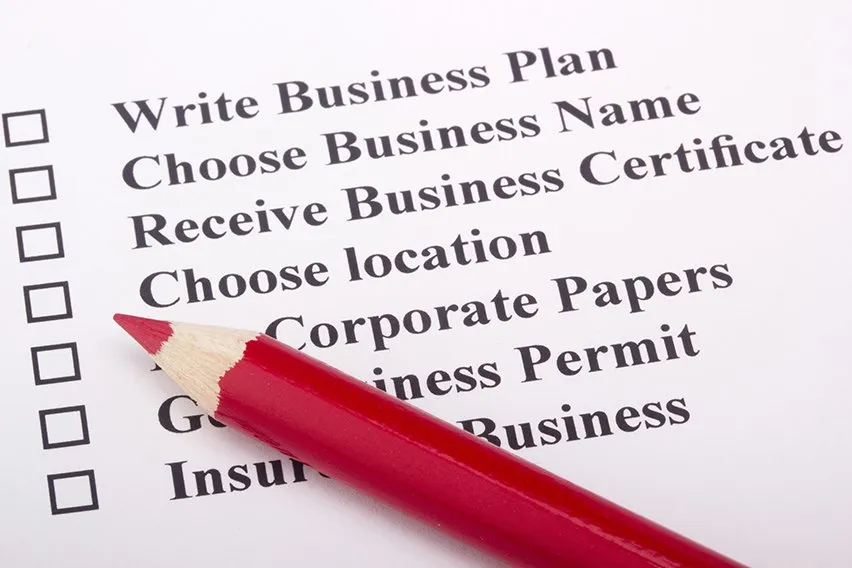Business Startup Checklist: A Small Business Guide

So you’ve decided to start your own small business.
Well, you’re in great company. In 2020, the number of small businesses in the US reached 31.7 million.
At 99.9%, small businesses make up nearly all US businesses.
Starting your own business can seem daunting at first. There seems to be so much to learn and so much to do that it can be overwhelming at times.
But the truth is, anybody can start their own successful small business.
You’ll have to work hard and commit to making it happen, but with a little know-how and a handy guide, there’s no stopping what you can achieve.
That’s why we’ve put together an 8-step business checklist to help get you started.
Here’s What We’ll Cover:
1. Come Up With Your Idea
Maybe you’re starting from scratch, or maybe you’ve got a million business ideas. But when coming up with an idea, you need to make sure that it’s tailor-fit to you. There’s no point starting up a cooking business when you have no knowledge or experience in food.
So make sure that you pick something you have a good knowledge base of, and something that you are passionate about.

2. Do Your Research
Market analysis is key. You’ll want to dive into the inner workings of the market you’re aiming for and make sure there’s a place for you.
Many businesses fail because they either haven’t correctly identified their target market. Or, they started a business with no unique selling point in an already saturated market.
3. Write a Business Plan
Not all good businesses start with a formal business plan. But that doesn’t mean there isn’t a huge amount of value in creating one.
No matter what type of business you plan on running, a business plan is a chance to really hone in on your idea. They are also a great way to set long-term goals to keep your business viable.
You’ll also want one if you’re looking for funding. Any potential investor will want to see a well-thought-out and thoroughly researched business plan.
4. Sort Out the Legalities
Before you can properly start running your business, you’ve got to make sure that you’ve filed the right forms and ticked the right boxes.
There are a number of local and state licenses that need to be filed. You’ll need to register your business name, you’ll have to file for trademark protection and any necessary insurances amongst others.
A good idea would be to hire an attorney if you want to be sure you’re doing things by the book.
5. Check Your Finances
If you’ve written a business plan, you’ll have had to pay extra attention to the finance section.
According to a U.S. Bank study, 82% of small businesses fail because of poor cash flow management and understanding.
Therefore you need to make sure you have enough money to finance the whole business through the financial year.
If needed, you can apply for funding, you can try and entice an investor, or you could be in a position where you can fund everything yourself.
6. Build Your Business
Are you an online business or a brick-and-mortar business? Do you need office space or warehouse space?
These are the questions you have to ask yourself, whether you need a literal business location or not. Even a fully online business might need space to store inventory.
You should also put some thought into whether you’ll need to hire any staff or if you can handle the business by yourself.

7. Market Your Business
Marketing is key. How are you supposed to sell anything if you can’t spread the word and attract customers?
The best way to identify and plan your marketing strategy is with a marketing plan.
Here you can lay out how you plan to market your business, what sort of demographic you will be targeting and what your ideal customer may be.
Many businesses around the world attract huge attention on social media sites such as Instagram or TikTok. So it makes sense to include whether these platforms are a viable avenue for you and your audience.
8. Launch Your Business
Now that you’ve got everything sorted, the only thing left to do is open your doors. Whether that is literally or metaphorically, a launching day is a key time.
You’ll be able to see if your business allows a good customer experience and you can make notes and tweak any issues you see.
Key Takeaways
Starting a business is a long and tough process.
But with the right mentality and a good deal of planning and research in place, you can make your business a success.
Any good business has a good finance department. And every good finance department has an integrated accounting software like FreshBooks.
FreshBooks is accounting software that provides accounting solutions to startups. With all client estimates, invoices, payments, credits, and other financial info in one place, it’s easy to keep track of clients.
Are you looking for more business advice on everything from starting a new business to new business practices?
Then check out the FreshBooks Hub.
RELATED ARTICLES

 How to Get Government Contracts: Tips for Small Businesses
How to Get Government Contracts: Tips for Small Businesses How To Sell Products Online? An Extensive Guide
How To Sell Products Online? An Extensive Guide What Is a Micro Business & How to Start One?
What Is a Micro Business & How to Start One? How to Start a Corporation: A Step by Step Guide
How to Start a Corporation: A Step by Step Guide How to Start a Restaurant: A Step-by-Step Guide
How to Start a Restaurant: A Step-by-Step Guide How to Start a Vending Machine Business (4 Easy Steps)
How to Start a Vending Machine Business (4 Easy Steps)